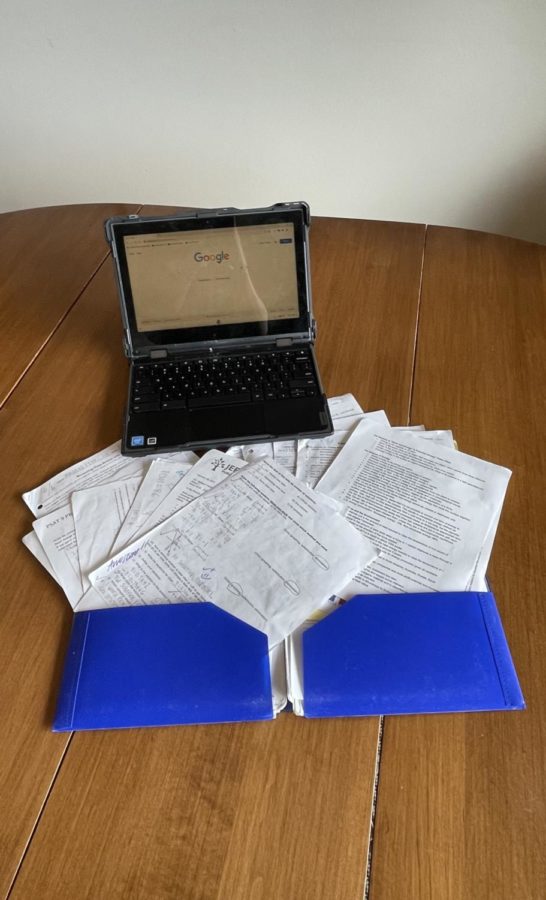Should teachers communicate more, lessen the burden of homework on students?
An important question, seen through the eyes of five teachers.
Homework. Teachers assign it, students grapple with it, and rarely is it enjoyable. The idea of whether or not students should have to take home assignments in the first place is its own debate, but for now, homework is here and here to stay.
The four major departments of Arvada West (Science, Mathematics, English, and Social Studies) all have different parameters for homework: some only assign homework if assignments are left unfinished in class, others make sure there are weekly worksheets handed out. Of course, each individual teacher is different, but there are noticeable similarities between departments.
However, if teachers were to communicate more with each other about assigning homework, both within and without their departments, would it benefit students? Some obvious benefits stand out. For one, students wouldn’t have to juggle assignment after assignment one week, and then have hours of free time the next. This would result in more balanced schedules, which would possibly lead to benefits in students’ grades and work ethic.
There are also negatives to making students’ schedules easier to manage. The main goal of high school is to prepare students for their next step in life, whether it be college, trade school, or the workforce. By making schedules balanced, or at least close to it, teachers would be under-preparing students for life after high school.
While it is evident there are pros and cons to teachers communicating more, especially about homework, the most important question is this: what do teachers think of this topic? They are the ones who would have to set aside their time, change their policies, and create flexible schedules. Without further delay, here are the opinions of five Arvada West teachers.
Allison Campe: “Strong communication and common goals for teachers benefits students.”
Allison Campe, a mathematics teacher, praises communication between students, stating that “strong communication and common goals for teachers benefits students.” In terms of communication between teachers, she shares that “Staff is required to participate in a variety of department PLCs” (Professional Learning Communities) but “content teams meet weekly.” Also, departments participate in “staff meetings and professional development days pre and post semester and monthly throughout.”
With all of this communication, the burden of work on students, especially in a condensed time frame, is lessened, correct? Not exactly.
Campe states that she is “not too sure” regarding if an important (and time consuming) assignment is happening in another class. Additionally, she states that “I know English and Math completes a Capstone Project for a graduation requirement,” but that is about the extent of her knowledge.
According to Campe, homework aren’t tedious assignments to be filled out, but rather “practice options for students.” It is due to this approach, as well as standards based grading in the math department, that leads to less homework assigned in her classroom.
However, Campe still values the importance of homework and uses it as an incentive, sharing “Many times students can not make test corrections and have retake opportunities if they have a ton of missing work.” This can lead to more students completing assignments, but does not guarantee an increase in work ethic and grade improvement.
In fact, Campe shares that in terms of homework, she “would like to communicate with other departments about this (homework), but honestly, the majority of students are not going to complete the homework anyways.” This leads to her not viewing it necessary to curb homework, because if students are not going to do the work in the first place, it does not make sense to tinker with the assignments they are given.
Clark Grose: “If students have not developed good study skills in High School, we are setting them up for failure in college.”
Clark Grose, who teaches Science, agrees that communication is extremely beneficial for teachers, sharing, “Communicating with other teachers definitely benefits students because it allows them to see what other teachers, who are teaching the same courses, have done and what has worked best for them.” He points out that if teachers are all on the same page, they can improve the assignments they give students as well as the way they teach, which in turn creates a better learning environment for students.
He also states that “The science department is good at communicating with each other. Mostly it is done through our PLC (Professional Learning Community) time.” He also shares that “Teachers from other departments do not usually communicate very much. That does lead to large projects/exams being scheduled at the same time. We need to do better at that.”
While he praises communication, Grose has strong opinions on homework, pointing to a shift he has seen in teacher’s approaches to assigning it. “Homework is a big issue in high schools these days. A lot of teachers do not give homework because ‘students won’t do it’. I think that is the wrong approach, learning should not just be when you are at school” he voices. He also reflects that “As little as 10 years ago, most teachers gave a significant amount of homework. Unfortunately, we are lowering our standards.”
Finally, he states “I would not be willing to lessen the amount of homework,” explaining that “if students have not developed good study skills in HS, we are setting them up for failure in college.”
Tina Gregoire: “There’s always a balance of what is best for our students and what they need to know to be prepared for whatever they decide to do when they leave high school.”
Tina Gregoire, a social studies teacher in her first year, shares how she has prioritized communication, stating, “I meet with each of my subject areas once a week for about 45 minutes. I meet with all the other World History teachers on Wednesdays and all the other World Geography teachers on Thursday.” She also states that she tries “to meet with the English department as much as possible.”
She has nothing but praise for these meetings, adding “I absolutely believe that communicating with other teacher’s benefits students. When we are all on the same page, we are all doing what is best for students.”
However, when it comes to homework, Gregoire feels that her hands are tied. “The reality is, there are only so many hours in the school day and we are required to teach to a curriculum,” she shares, pointing to how there is limited flexibility in the amount of work needed to be completed.
She also states that there is “always a balance though of what is best for our students and what they need to know to be prepared for whatever they decide to do when they leave high school.” Evidently, it is important to maintain that balance, but Gregoire feels that there is more that can be done to lessen homework.
“I do think that we can lessen the amount of homework students have. If there were ways to work together with other subject areas to meet all the curriculum requirements, that would be great, and I would absolutely be willing to look into that” she shares.
She reflects that “I’m always willing to look at new ways to help our students.”
Kimberly Mizenko: “Just like I have to prioritize content that I teach, it is the responsibility of students to prioritize what is important to them.”
Kimberly Mizenko, a mathematics teacher, echoes what other teachers have said about communication, sharing, “There really isn’t a time that I keep to myself. My coworkers and I discuss successes and failures of our students and our own instruction. We talk about new ideas we’ve tried or are considering implementing in our classrooms.”
However, she points to benefits that transcend the classroom yet still benefit her school life, such as forming friendships with fellow teachers, building connections with students, and creating a “circle of trust” at work. These relationships are long lasting and important, especially when, as Mizenko states, “Most people quit teaching within the first five years.”
Moving on to homework, Mizenko shares insight on how “As a department, we have moved away from grading homework.” However, she shares “that doesn’t mean I don’t think it is absolutely critical to student success. Ask any math teacher and they’ll tell you how much content we had to skip because of time constraints.” In order to meet the curriculum, Mizenko has to prioritize what she’ll teach, including the necessary amount of homework to assign, so that students learn what is most important.
On top of this, Mizenko has to take into account snow days, musicals, tech week, field trips, band activities, vacations, social/emotional needs, COVID learning gaps, sporting events, and oftentimes, student motivation. After all of this, it becomes evident that “The only way for students to be successful in a high school math class is if they are willing to practice.”
In terms of lessening the work she assigns when there are big projects in other classrooms, Mizenko shares that “I do hear about big projects and non-academic situations my students find themselves in. That said, I have to prioritize covering as many topics required by my curriculum as possible.”
She adds that even if reducing homework were a viable option, “I wouldn’t do my students the disservice of eliminating practice opportunities just because they have other things in their life.”
It is clear that in Mizenko’s eyes, homework isn’t a burden, but an opportunity. Whether or not students seize this opportunity is up to them, as she shares that “just like I have to prioritize content that I teach, it is the responsibility of students to prioritize what is important to them.”
Above all, Mizenko hopes that “maybe, just maybe, students can appreciate how much effort we are putting in to give them an opportunity to grow.”
Jeremy Tanguma: “I don’t really take into account what other teachers are doing because I know there’s a lot of variables as far as what’s going on in their class.
Jeremy Tanguma, an English teacher, communicates often. “At meetings, at lunch, in between classes, sometimes during class when we need to,” are just some of the times when he interacts with other teachers. For him, everyday communication is, “Mostly about personal stuff” while “the meetings are mostly about work.”
In terms of meetings within his department, he shares it happens “rarely,” around two or three times a year. He explains that he mostly participates in “staff meetings, where we are listening to administration or trainers from the district.”
Despite less meetings, the English department assigns homework in similar ways, and that means not very often. Tanguma shares that when homework is assigned, it is often “Based on what’s not finished in class” and that “we (the english department) try to not give homework.”
He states that regarding different departments, he doesn’t “know if it’s different in some content areas, like math, history.” He also is not informed by other teachers when important projects are assigned in other departments, save for the information that he gets from students.
As for limiting the homework he assigns, he shares that “I do think it’d be possible, I don’t think it’s very valuable.” His explanation: “I think that learning how to navigate all that as a student is a skill that you’ve got to figure out as far as school goes. It’s valuable to figure that out for yourself and unfortunately sometimes it’s stressful but it’s not something that is not valuable.”
He adds that, “I don’t really take into account what other teachers are doing because I know there’s a lot of variables as far as what’s going on in their class.”
Is homework valuable? Debatable. Is it necessary? Also debatable. One thing that is not up to speculation, however, is that while communication between teachers at Arvada West could possibly lead to less or more manageable homework, just because something can be done doesn’t mean that it should be done. If Arvada West students listen to these teachers and take their advice into consideration, then maybe they will come to understand the importance (and complexity) of how teachers set kids up for success.

Madeus Frandina is a Junior at A-West who loves anything involving literature and plays soccer. He is a huge Liverpool FC and Carolina Panthers fan, and...



